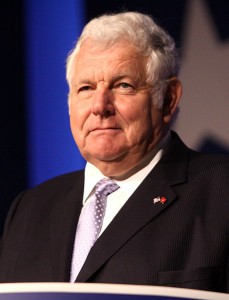Over the past month as the circumstances of Trayvon Martin’s death have become common knowledge many commentators have called into question why Black people are so energized by this incident. They claim that Black leaders have made the incident into a racial issue and used the tragedy as a vehicle for their personal gain.
One such voice is that of Bill Bennett, a person who I usually think of as reasonable, but I find myself disappointed with his simple and one-sided piece on CNN’s website, Rush to judgment in Trayvon Martin case. In it, Bennett voices fair skepticism to pronouncing Mr. Zimmerman guilty of murder. Obviously only Zimmerman and Trayvon know what really happened. Moreover, our system of justice demands innocence until proven guilty, so Bennett is right to call for people not to rush to judgment. But Mr. Bennett’s explanations for why we should not rush to judgment go far beyond the obvious reasons I have stated. Through his reasoning he reveals a deep misunderstanding of what drives the outrage and his own inability to be objective.
In his piece Bennett tries to set a stage where Zimmerman’s actions are understandable. He cites reports of Trayvon’s troubles at school and writes about the crime in the neighborhood over the past year, and how according to neighbors Zimmerman is passionate about security.
This suggests that Trayvon was a troublemaker and was possibly causing problems that could justify his killing. Somehow Bennett thinks it is important to point out that Zimmerman identifies as Hispanic and a Democrat. I guess he believes that Hispanic is synonymous with being a person of color and that as a member of the liberal political party friendly to Blacks; Zimmerman is insulated from charges of racism. Of the many people who have spoken out about Trayvon, Bennett chooses two names that incite anger from many of his conservative allies – Jesse Jackson and Al Sharpton – , to provide examples of people rushing “….to judgment with little regard for fairness, due process, or respect for the terrible death of a young man.”
One offensive portion of the essay is his accusation that the reaction to Trayvon’s death is “selective outrage.” He explains that of all the Black homicides, about 93% are committed by other Black people and he actually asks, “Where are the marches and protests for these victims? Is it justice people seek or are they looking and even hoping for signs of white racism so they can exploit it?”
But the most offensive part of his essay is where hey quotes Dr. King’s Letter from a Birmingham Jail, “Any law that uplifts human personality is just. Any law that degrades human personality is unjust.”
He twists the meaning of King’s words by writting, “While we wait and respect due process of law, we should do our part to uplift human personality. We can do so by giving both Martin and Zimmerman a just weighing of the evidence, both in the court of law and public opinion. Let us not assume the worst of anybody but be guided by the facts.”
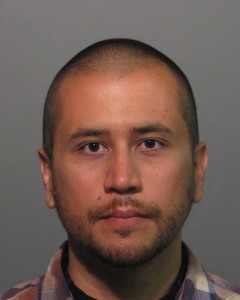 Bennett’s analysis disregards some important facts. Zimmerman followed and killed Trayvon, this is not in dispute. It is also true that for a time Zimmerman’s story about how and why it happened stood without official scrutiny and it looked to most observers who knew about the case that the investigation was over. It took public outrage to move it forward. The story probably would have gained some level of national attention if Zimmerman had been arrested and due process followed, but it attracted the reaction Bennett denigrates because of inaction by the justice system. This explains why Black people are so animated and outraged over the killing. It is clear to us that our lives mean little and that our children’s lives can be taken and dismissed based on the word of the person who did the killing. This reminds us of the days of Jim Crow or before when Black people had no equal protection under the law. Today, while our written laws may speak equality, our realities do not, as Trayvon’s killing demonstrates. It brings to mind for me the words of Vernon Johns, pastor of Dexter Baptist Church right before Dr. King, “A rabbit is better off than a Negro because in Alabama niggers are always in season.”
Bennett’s analysis disregards some important facts. Zimmerman followed and killed Trayvon, this is not in dispute. It is also true that for a time Zimmerman’s story about how and why it happened stood without official scrutiny and it looked to most observers who knew about the case that the investigation was over. It took public outrage to move it forward. The story probably would have gained some level of national attention if Zimmerman had been arrested and due process followed, but it attracted the reaction Bennett denigrates because of inaction by the justice system. This explains why Black people are so animated and outraged over the killing. It is clear to us that our lives mean little and that our children’s lives can be taken and dismissed based on the word of the person who did the killing. This reminds us of the days of Jim Crow or before when Black people had no equal protection under the law. Today, while our written laws may speak equality, our realities do not, as Trayvon’s killing demonstrates. It brings to mind for me the words of Vernon Johns, pastor of Dexter Baptist Church right before Dr. King, “A rabbit is better off than a Negro because in Alabama niggers are always in season.”
This may sound over the top, but how should I feel? When I first heard about the story from my wife we were in Costa Rica having dinner with another couple and she shared the story. I nearly began to cry. I thought of my son and my grandson. I had a flashback to the death of Amadou Diallo and the 41 shots hitting his body 11 times. I was not as outraged by Amadou’s killing as by the finding that the police officers acted within their rights to shoot an unarmed man, a man who like so many other times in the past was Black. Now it seems that a civilian can kill a Black person and the death can go uninvestigated. How are we supposed to react when it appears once again that a Black man can be killed with impunity? Could all of us be wrong as Black people to feel this way? We did not gather at a meeting or have a phone conference and agree to react with such outrage. It is a feeling that bubbles up from within us. Perhaps there has not been such a national outcry from Blacks about the murder of a stranger since Emmitt Till.
I am amazed by Bennett’s question about his perception of a lack of outrage in the Black community when Black people kill each other. He does not ask this question out of genuine concern or curiosity; rather, it is an accusation that a whole community is guilty of faulty thinking and more concerned about blaming “Whitey” than taking responsibility for ourselves.
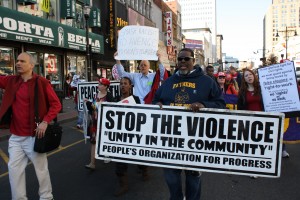 We are well aware of this cancer of violence that plagues our communities and the gangbanger thug mentality that perpetuates it. We invest immeasurable energies into trying to stop this self-destructive behavior through programs, activism, dialogue and religious community. A prime example is the Newark Anti-violence Coalition. These are young people, many of whom have had their share of troubles, who have decided to make a difference through positive action. They have demonstrated by shutting down intersections at the site of murders in Newark and the surronding communties every Wednesday for nearly three years. They reach out to the demographic usually participating in and victimized by this violent behavior. No one is harder on Blacks about these issues than Blacks themselves. Both Jackson and Sharpton constantly raise these issues and challenge our community to take action to change. In fact, the New Black Panther Party in part exists because of this violence. They are individuals who band together to confront violence in the trenches. While I do not agree with all their rhetoric or tactics, I understand their frustration and anger. Has Bill Bennett ever marched in an anti-violence march in any Black community? I hope so. If so, he should know the pain felt by the community at the double tragedy of the death and another one of our babies turned killer going to prison.
We are well aware of this cancer of violence that plagues our communities and the gangbanger thug mentality that perpetuates it. We invest immeasurable energies into trying to stop this self-destructive behavior through programs, activism, dialogue and religious community. A prime example is the Newark Anti-violence Coalition. These are young people, many of whom have had their share of troubles, who have decided to make a difference through positive action. They have demonstrated by shutting down intersections at the site of murders in Newark and the surronding communties every Wednesday for nearly three years. They reach out to the demographic usually participating in and victimized by this violent behavior. No one is harder on Blacks about these issues than Blacks themselves. Both Jackson and Sharpton constantly raise these issues and challenge our community to take action to change. In fact, the New Black Panther Party in part exists because of this violence. They are individuals who band together to confront violence in the trenches. While I do not agree with all their rhetoric or tactics, I understand their frustration and anger. Has Bill Bennett ever marched in an anti-violence march in any Black community? I hope so. If so, he should know the pain felt by the community at the double tragedy of the death and another one of our babies turned killer going to prison.
Bennett asks what Jesse Jackson is talking about when he says that arresting, incarcerating and ultimately killing Blacks is big business? That’s easy, look who is in prison and why. Look who is on death row and why. It is well known that the incarceration rates for Blacks are dramatically higher than for Whites. What may not be so well known is that the high rate is driven by the drug war and that Blacks go to jail for behaviors in which Whites equally participate. The targeting of Black communities and bias criminal justice policies result in more Blacks in prison for drug crimes and facing harsher sentences. Once again, how should we react to these realities?
Bennett and others sermonize that this incident should not be racialized. He claims that outspoken Black leaders and their followers “are not on an impartial hunt for justice but are exploiting this crisis for personal or political gain and claiming that it is representative of larger societal problems.”
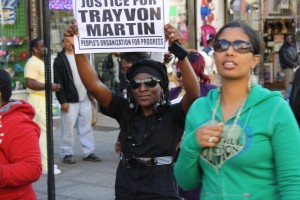 When Amadou was killed and the police found innocent of any responsibility for his death I wrote,
When Amadou was killed and the police found innocent of any responsibility for his death I wrote,
“Is there a proper perspective to see the ramifications of Mr. Amadou Diallo’s death? Can we set aside the concept of race and properly understand who must be held accountable for the tragedy? The answer is to look at Amadou’s death through the critical lens of human rights and the idea of a liberal democracy.”
I believe this is also the proper perspective to examine the death of Trayvon Martin and the circumstances that led to this tragedy. But Amadou’s death also led me to write this,
“The acquittal of the four police officers of any responsibility for the death of Amadou Diallo was a blow to my psyche. I felt as if something physically hit me in the chest. I was weighed down with my Blackness. This is a terrible statement to make, and an even more horrible way to feel. Sometimes one gets tired of being singled out, ignored, devalued, criminalized, marginalized, and targeted. Sometimes one can get a feeling of despair. This is what I felt for a moment when I heard the verdict of the Albany jury.”
Those feelings returned upon hearing about the circumstances of Trayvon’s death. This has happened too many times to too many Black people. Bennett is right that the answer to this is not about race, but the reality of it is about race. If Trayvon had been White he would be alive or the shooter would have been arrested. Of course we do not know that for sure, but what Black people know is that it is more than likely true. How do we know this? Because we live the reality of what it means to be Black in America every day, and we have seen this before.
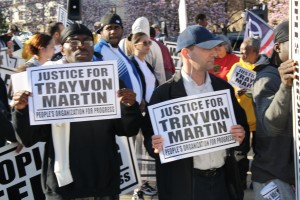 When Dr. King wrote his letter from the Birmingham jail he wrote it because he was outraged by the inaction of clergy to speak out against the obvious injustice of racism. There is no doubt that King would have marched today for Trayvon. Not to call for revenge or for Zimmerman’s head, but to call for justice. Justice had no chance if Mr. Zimmerman did not go to trial, no matter what the “stand your ground” law says. An unarmed boy walking home minding his own business cannot be killed by a man who followed him and there be no trial. The fact is that no matter Trayvon’s behavior before that day, or what happened between he and Zimmerman, had Zimmerman followed police orders and left Trayvon alone, Trayvon would have made it back to his dad with his Skittles and Zimmerman would be an unknown name. No trial, no justice. No outrage, no trial.
When Dr. King wrote his letter from the Birmingham jail he wrote it because he was outraged by the inaction of clergy to speak out against the obvious injustice of racism. There is no doubt that King would have marched today for Trayvon. Not to call for revenge or for Zimmerman’s head, but to call for justice. Justice had no chance if Mr. Zimmerman did not go to trial, no matter what the “stand your ground” law says. An unarmed boy walking home minding his own business cannot be killed by a man who followed him and there be no trial. The fact is that no matter Trayvon’s behavior before that day, or what happened between he and Zimmerman, had Zimmerman followed police orders and left Trayvon alone, Trayvon would have made it back to his dad with his Skittles and Zimmerman would be an unknown name. No trial, no justice. No outrage, no trial.
